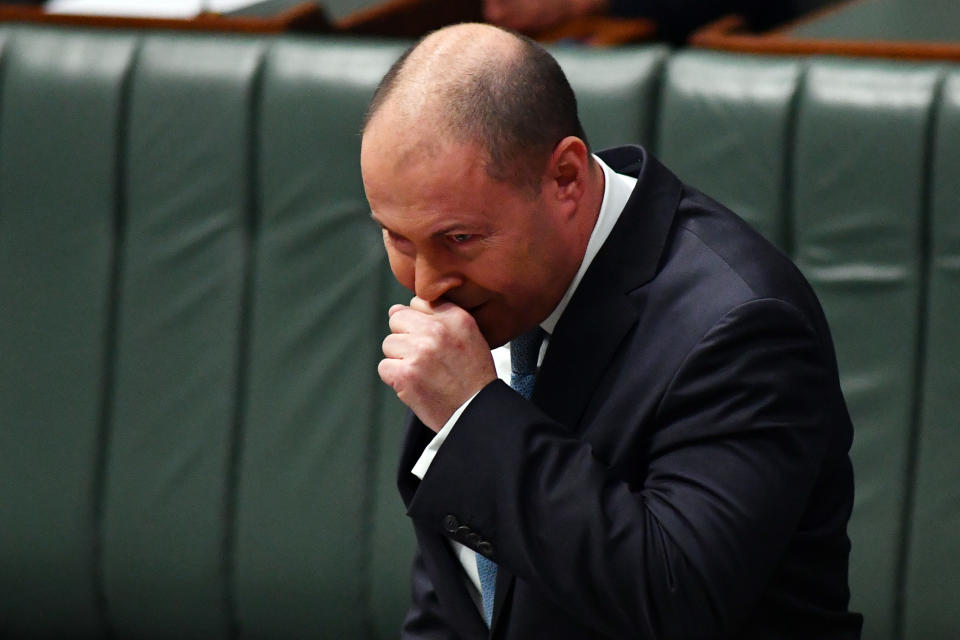Frydenberg coughs his way through grim economic update

Today, Federal Treasurer Josh Frydenberg was supposed to deliver the first Australian budget surplus in years.
Also read: PM reveals the 'new curve' Australia must flatten to beat virus
Also read: How will we pay for coronavirus?
Also read: No guarantee JobKeeper, JobSeeker will last 6 months: PM
As he said in April 2019: “I announce that the budget is back in black and Australia is back on track. For the first time in 12 years, our nation is again paying its own way.”
But instead of announcing that realised surplus to crowded rooms of journalists and politicians, he coughed his way through an increasingly grim economic update to a socially-distanced parliament.
Australian Treasurer Josh Frydenberg delivers budget statement. #COVID19 pic.twitter.com/YxUVvfgGs3
— Vader (@vader_ford) May 12, 2020
The short of it?
Unemployment is set to soar as high as 10.1 per cent, while gross domestic product is expected to fall by 10 per cent or $50 billion – the largest tumble on record.
That fall is equivalent to the total quarterly production of South Australia, Tasmania, the Northern Territory and the ACT, Frydenberg said.
Around one million Australians have lost their jobs since the middle of March, and Treasury estimates that will climb to 1.4 million in the June quarter. Household consumption, business and property investment are all forecast to slide significantly and international travel is gone.
Speaking on the day that should have been the release of the 2020/21 Federal Budget, Frydenberg said Australia had been dealt a serious blow but would recover.
‘The proven path is not through higher taxes’: Josh Frydenberg

Frydenberg said the path to recovery will not be through higher taxes, but instead through encouraging investment and boosting productivity.
“Encouraging personal responsibility, maximising personal choice, rewarding effort, and risk taking, while ensuring a safety net which is underpinned by a sense of decency and fairness,” he said.
“Unleashing the power of dynamic, innovative and open markets must be central to the recovery with the private sector leading job creation, not government.”
He said upskilling and reskilling workers and cutting red tape will also be part of the recovery along with tax reform and industrial relations reform.
Treasury modelling predicts the lifting of stage one restrictions will see 250,000 people back at work, and boost GDP by $3 billion.
In New South Wales, that’s 83,000 jobs and $1 billion dollars. For Victoria, it’s 64,000 jobs and $715 million and in Queensland it’s 51,000 jobs and $610 million.
In Western Australia, a success story will look like 25,000 people back at work and a budget boost of $435 million and in South Australia, 17,000 people back at work and $178 million.
Down in Tasmania, stage one restrictions lifted should deliver 5,000 people back in work and $50 million and in the ACT, 4,000 jobs and $60 million.
In the Northern Territory, the increased freedoms should see 3,000 jobs and $40 million returned to the economy.
“However, these improvements in the economy depend on us continuing to follow the health advice. Failing to do so could see restrictions re-imposed at a loss of more than $4 billion a week to the economy,” Frydenberg said.
“If our largest state, New South Wales, had to reimpose restrictions, equivalent to those in place before the 8 May national cabinet meeting, it will cost its economy around $1.4 billion per week.
“For Victoria, the cost would be around $1 billion. In Queensland, $800 million, in Western Australia, $500 million, in South Australia $200 million, in Tasmania $100 million, in the ACT, $100 million, and in the Northern Territory, $40 million per week,” he continued.
“This is the economic cost we all have to bear if we fail to act.”
Follow Yahoo Finance Australia on Facebook, Twitter, Instagram and LinkedIn.

 Yahoo Finance
Yahoo Finance 

